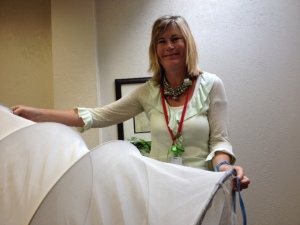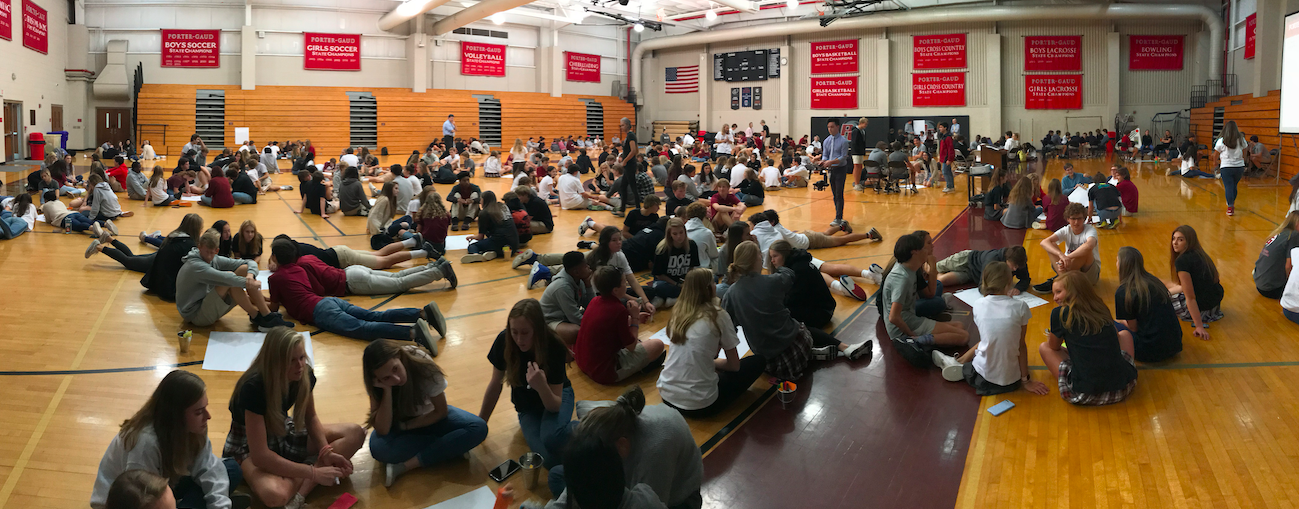Julie Bragdon, Assistant Head at Montessori School of Denver sums up how she views their school: “We are a wave, not a museum”. MSD prides itself on a rich heritage of the Montessori method and culture, but also in continuing to innovate in ways that would make Maria Montessori proud. My main takeaway from my visit this morning is that this school has found a way to truly be “nimble and dynamic” by constantly refreshing their curriculum along broad, thematic frameworks. Julie says that this constant evolution of the curriculum does not allow inertia to set in as it does with a more static structure. They really cannot “go down their own rabbit hole” of static programs, since the entire philosophy of the school is based on this constant refresh mindset.
At a high level, MSD has adopted NAIS President Pat Bassett’s 6 C’s of 21st Century learning as a general guideline. Their broad mission: students should leave prepared to “do good in the world”. Aligning the 6 C’s with this goal for global engagement and citizenship seems to create a very active template within which their teaching teams build actual curriculum. They want their students to “build bridges” and connect ideas across curriculum areas, so they build access to content mastery within this contextual paradigm.
MSD includes students in the process of developing their own learning projects. Recently they teamed with a school in Zambia and set out to raise money to buy mosquito nets in the fight against malaria. As the students on two continents blogged back and forth, MSD quickly found out that Zambia has an overflowing supply of nets, but that most are designed to work with a bed; many of their partner children sleep on the floor. So MSD students designed a new kind of mosquito net, patent pending (see photo).
MSD has four large through-going themes within which teachers tweak curriculum: stewardship, leadership, sustainability, and entrepreneurialism. By the 6th grade their students are developing projects that weave together strands from all of these themes. Work within this thematic approach from an early age gives students access to a 21C skill set, even if they go off to a more traditional school after 6th grade.
Head of School Stephanie Flannigan says, “MSD is a starting place”. She explains that many of what we now consider to be 21C best practices are inherent in the Montessori tradition. They urge their students to think in terms of connections and teach across content areas. Their daily schedule is built around large themes, not particular subjects, and students are grouped in 3-year age ranges. With a more fluid daily routine with students interacting on a constant basis, Stephanie says, they are teaching social and emotional skills all day, not just at recess. By definition, they do not have many of the silos of class, age, time, and division that are inherent obstacles to innovation.
Stephanie lives a management 2.0 philosophy; distributed authority is not just an idea. She has created a shared philosophy, which seems to be “Montessori plus”, and hires people who can work within that framework. She and her leadership team provide broad direction, but leave most of the details up to the faculty. They avoid one of the pitfalls of Management 2.0 in some schools, where we see distributed leadership and responsibility exacerbate silos as each teacher feels that he or she is independent within their own domain. MSD avoids this as teachers create units, share ideas at faculty meetings, and are expected to complete and share out their own research and material with colleagues as well as with the students. The daily schedule accommodates shared time amongst the faculty, so they do not find that they need extra PD time when teachers want or need to tweak last year’s units to meet the revised current year themes.
MSD is full of bright light, project-based, experiential learning, much of which the students have a hand in inventing, with teachers adopting the role of facilitator. Bragdon and Director of Global Studies Chris Imhoff describe their graduates, based on alumni feedback and reports from teachers at schools that readily accept MSD graduates, as empathetic, comfortable with collaboration, self-directed, and relaxed when engaging adults.






[…] Day 4: Self-Evolving Curriculum at Montessori of Denver […]